Text
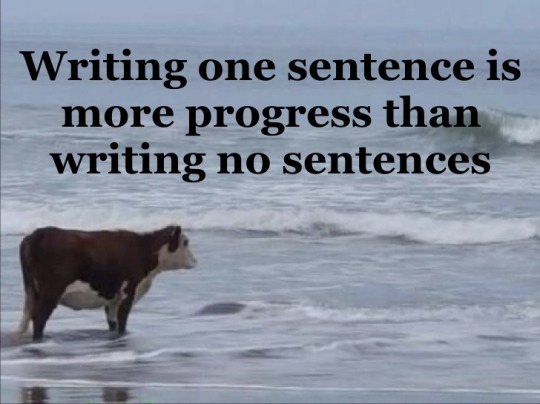
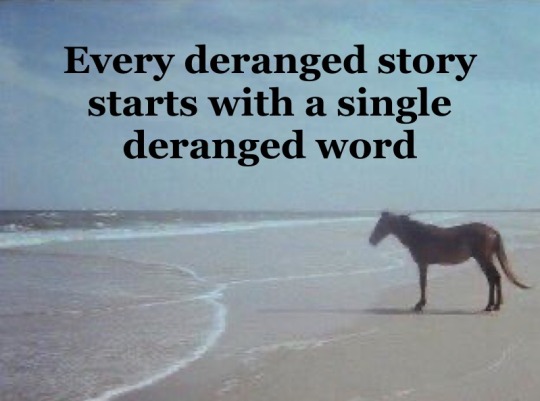
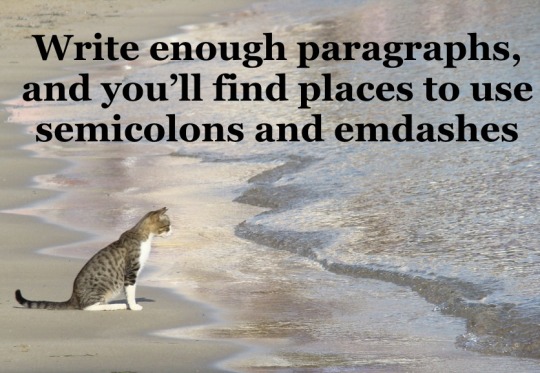
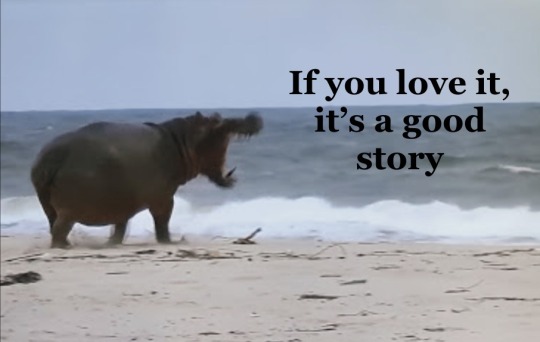
#inspirational?#I'm particularly weird today (complimentary)#writeblr#writer community#writers on tumblr
55K notes
·
View notes
Text
1. I filled up my lama journal, so now it's time to move into the cats and caffeine journal! Greetings, new journal!
2. I edited chapters 13 AND 14 today, and got some work on 15!
Teaser: there was a fight scene in which I used the word "slam" or "slammed" NINE FUCKING TIMES on one page! That has been reduced to one time. Yay me!

#writeblr#writing life#writers on tumblr#writer things#cats#coffee#cats and coffee are life#progress is progress#I am editing a vampire novel
0 notes
Text
No one wants to work anymore, and not even reframing it as "get to go to work" instead of "have to go to work" is helping.
7 notes
·
View notes
Text
I never like to report that I haven't done much writing. So I haven't. Reported it, I mean.
I have a lot of reasons why. I went camping, I've had a lot of house chores to do, work has been super busy, therapy has been tough.
These are valid things. But I still feel bad saying they've pulled me away from the latest novel.
Anyway. That's the scoop today. I'm trying to find some time and make some solid progress for you. I will report back.
18 notes
·
View notes
Text
Oh kitty you're so bad
You're so bad you make me mad
Hey kitty!
👏👏👏
Hey kitty!
👏👏👏
1 note
·
View note
Text
Something, something, the sun's gonna explode, heat death of the universe . . . in conclusion, fuck bitches, get money, have fun.
#existential angst#existential crisis#the end of the universe#why did I survive the pandemic when so many people didn't?#why do I live in a time when vaccines exist when so many people over the milennia have died?#existential survivor's guilt
0 notes
Text
More cider, more editing! Today I finished chapter six, chapter seven, an interlude between seven and eight, AND started on chapter eight of Night Falls!
Apparently, I need to drink more.
Or write in public more, where I feel I have to look productive or someone will judge me.
1 note
·
View note
Text
Progress report: chapter two of Night Falls is edited. And then I ate cheese.

#writer#writeblr#writing life#writers on tumblr#writer things#on writing#cheese#as the internet knows you kay fascinate a woman with a piece of cheese
0 notes
Text

Mitra won't admit it, but he does like hanging out with me.
#if you want to write keep cats#cat#i love my kitty he does not love me#writeblr#writing life#writer things#gray kitty
0 notes
Text
Edits to Night Falls, book 4 in my vampire series, continue. The prologue is done, chapter one is underway!
0 notes
Text

0 notes
Text

Edits to Night Falls have begun!
#writeblr#writers on tumblr#writing life#writer#writer things#editing#self editing#writing vampires#my new vampire book#yee haw!#feral goblin writer
0 notes
Text

This gives me such a happy.
1 note
·
View note
Text
Hand written edits to In the Dark are DONE! Now to enter them on the computer . . . Sigh.
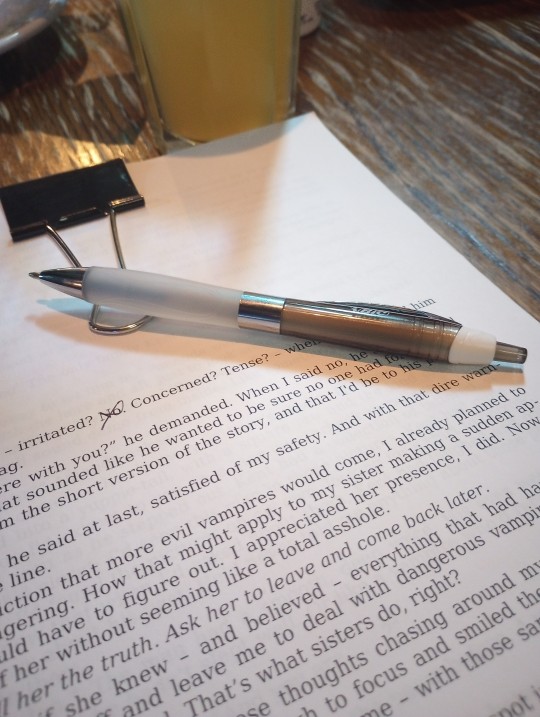
1 note
·
View note
Text
How to Help People
I had a job interview a while ago for office assistant at a chiropractor’s office. I gushed during the interview about how much I enjoyed helping people, how my previous jobs had involved helping others and how my current job didn’t include that aspect and how much it meant to me to be part of that again. I thought the interview was going along well until one of the doctors said, “You seem very enthusiastic about helping others. What are your ultimate plans?”
Instant deflate.
“I want to be a novelist.”
Oh, how does that help anyone? What good is being a novelist to anyone? I have never felt so ashamed about my passion before, and I instantly felt that I had betrayed myself by feeling that way. I know I didn’t do well the rest of the interview — I felt myself shrink down into a ball of misery as I tried to articulate why writing fiction is helpful.
I didn’t get the job.
But since then, I have thought long and hard about my passion for writing fiction and my passion for helping others and how those two things intersect. If anyone asked me today how I plan to help people, I could proudly answer that I intend to help by writing fiction.
When I was a kid, I was that most catastrophic of combinations: a smart girl. I was bullied, ignored, and both bookish and athletic. My mom raised us on county assistance, so we were poor, but we came from a middle-class background, which made us smarter and cleaner than the other kids I knew on assistance. (Sorry, truth; in my neighborhood anyway — the smart kids were all from middle-class families, the poor kids were dirty and stupid. Except for me and my sisters. I now know that hungry kids who are worried about life in general don't do great in school -- as a kid, I thought they were just stupid.) I was desperate for friends, but didn’t like just about any of the kids I went to school with, which made me needy and lonely and clingy but also sort of snobby. Not a good combination.
Books were my refuge. Books taught me that the world was bigger than my neighborhood, that there were bigger things out there, that I had a chance to find those things, that there were people out there like me, that there were places for me. I can’t even begin to tell you how much that helped me. I know now (having since grown up and met others like myself) that this isn’t uncommon among book-lovers.
Also, there is some pretty amazing research out there now that talks about two things:
One, how the invention of the novel created an ability in people to empathize with each other, to get inside someone else’s head and see how they view the world. There is a distinct correlation between the invention of the novel and the increase in literacy and the decrease in torture, murder, rape, criminalization of petty crimes and harsh penalties instituted by governments (like castration, mutilation, being burned alive, or hung, which was a long, slow death by asphixiation, not a quick drop-n-snap like it’s depicted in the movies. If a hanging victim died too quickly, the crowd of onlookers considered themselves cheated.).
Correlation doesn't equal causation, but this is interesting to me.
Two, reading novels makes people more empathetic, increases their vocabulary and their ability to comprehend complex ideas, and increases overall cognition.
Reading non-fiction doesn’t do either of those things, either in present-day minds nor in historical minds. The invention of the printing press and the increase of literacy doesn’t cause a blip on the historical charts of violence in society. When fiction novels start being written is when we start to see a steep decrease in state-sanctioned cruelty.
I don’t think I have ever been more proud of my calling. Not only can a novelist increase a modern-day person’s well-being, historically, we have increased the well-being of everyone in society. If you go to jail, they won’t torture you for a confession to your crime, modern police brutality aside. Thank a novelist. Look up Medieval torture devices — I dare you. You are not in danger of being subjected to one of those devices for the crimes of blasphemy, wearing the wrong sort of fabric on Sunday, saying unpleasant things about the king, or just being a war captive from the losing side of a battle. Thank a novelist. Read a good book lately? You are measurably smarter than you were before you read it. Thank a novelist.
My ultimate goal is to help people. I’m a novelist.
#writeblr#writing#writers on tumblr#writing life#writer things#writer#on writing#how fiction helps people#this is what I do
18 notes
·
View notes
Text
Phew, chapter forty-two of In the Dark edited! I'm smokin'!
#writeblr#writing#writer#writers on tumblr#fictionwriting#am editing#editing#getting the words right
0 notes
Text
Had my mojo working . . .
And then I started therapy.
Don’t get me wrong, therapy is good and helpful and I’m glad I started.
However, I have learned that when you haven’t dealt with a trauma or struggle, and then you start dealing with it, years later even, it will bring up all the fears and anxieties you never dealt with at the time. Or maybe even worse, because you’ve been having this bad response to situations that feel similar to that first bad one over and over and over again for years. So the bad response is really ingrained in your brain and your reactions.
Digging that up again can intensify that response while you deal with the original bad incident.
In my case, a nasty incident of being punished for being too creative in art class has been tripping me up. I knew this had happened — I don’t have clear memories of all of it but I know it happened — but I did not realize until literally this week that this is where my issue with confidence about my writing comes from.
Now, being punished for being too creative in art class sounds not fun, but the problem with this specific incident was that my teacher that year hated me and was constantly on my ass for breathing wrong. So this was just one more reason for her to humiliate me and be hateful towards me.
While listening to the “Unfuck Your Brain” podcast, the host outlined how to do a thought download — which is literally just thinking of the incident that presently gives you trouble and writing down every thought that comes to mind about it. Now you have a list of things to work on counteracting. The exercise isn’t about figuring out where the negative thoughts come from, it’s just to identify what the negative thoughts are.
I love the Unfuck Your Brain host, but she has said that therapy helps you identify where your thoughts and feelings come from, it doesn’t help you get past them. She’s also said it doesn’t matter so much where your thoughts come from, as much as figuring out how to change them. I think she needed a new therapist, and while I agree that changing negative thoughts is the key to life, I think knowing where they come from is incredibly helpful in coming up with positive thoughts to counteract them.
When I sat down to do the thought download as it relates to my fears around writing, one phrase kept coming back: People will be mad at me, and they will try to hurt me.
That always confused me. Why would people try to hurt me? Why was my brain fixated on people being mad at me and trying to hurt me if they saw my books? Not even if they read them, just if they saw them.
I worked my butt off on that phrase, and had started making some real progress after like, four years of trying to change my thoughts about that. Got my mojo working!
And then I got into therapy and the memory of being punished for being too creative in art class popped up. And my mojo withered back up and died. I actually had a panic attack trying to do some editing this past week.
I’m not dismayed, though. Well, maybe a tiny bit. But here’s the thing: Now that I know that’s the cause of my fears, I can work on it. I’m already in therapy for other traumas, I can just add this to the list and get it cleaned up.
This time, now that I know exactly where this fear is coming from, I’m betting I can get it cleaned up a lot faster, and probably for good.
My mojo may be temporarily unavailable, but when I get it back, it’s gonna blow everyone’s mind.
1 note
·
View note